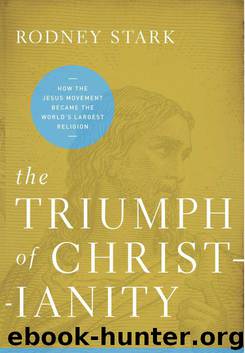The Triumph of Christianity: How the Jesus Movement Became the World's Largest Religion by Rodney Stark

Author:Rodney Stark [Stark, Rodney]
Language: eng
Format: epub
ISBN: 9780062007681
Publisher: Harper Collins, Inc.
Rural Neglect
IF MOST MEDIEVAL EUROPEANS did not attend church, a primary reason was that for many centuries only the nobility and those living in towns and cities had a local church to attend! Most churches in rural areas were not located in peasant villages, but were private chapels, each maintained by a local nobleman for his family and retainers, being only about the size of “a moderately large living room in a modern house.”64 Until the thirteenth century and later, most peasants could have contact with the church only by travelling a considerable distance for baptism or marriage, and by occasional visits by an itinerant friar. This was consistent with the antirural outlook of the early Christian movement which, in turn, reflected the urban snobbery of Rome—the term pagan comes from the Latin word for rustic or rural-dweller ( paganus ). As Richard Fletcher explained: “The peasantry of the countryside were beyond the pale”; hence urban Christians made little or no effort to evangelize them. Rather, for early Christians “the countryside did not exist as a zone for missionary enterprise. After all, there was nothing in the New Testament about spreading the Word to the beasts of the field.”65
Even when rural parishes did begin to appear, they suffered from neglect and most of them probably lacked a pastor, even an ignorant one, most of the time. Eamon Duffy has estimated that during the sixteenth century, for example, as many as 80 percent of the churches in the diocese of Geneva had no clergy. To make matters worse, even when there was an assigned pastor, “absenteeism was rife.”66 Thus the bishop’s visitation of 1520 found that of 192 parishes in Oxfordshire, 58 pastors were not in residence.67 The same was often reported in Italy—absent clergy, many villages with “no services at all.”68
How then could the peasants be expected to possess any Christian culture? Where should they have learned the Lord’s Prayer or who preached it, especially since even if they had a local priest, he probably didn’t know either? What seems most remarkable is that the rural populace even knew who Jesus was, at least to the extent that he was one of the divine beings who could be called upon for blessings.
Eventually, of course, subsequent to the Reformation, Protestants in northern Europe and Counter-Reformation Catholics in the south (and Anglicans in Britain) initiated vigorous campaigns to educate and activate the peasant masses and the rapidly expanding urban under-classes. Thus, Martin Luther had optimistically launched massive programs to inform and energize the Lutheran parishes in Germany. But before he died, he recognized that these efforts had failed, as demonstrated by the reports from Lutheran visitations mentioned earlier in this chapter.
Download
This site does not store any files on its server. We only index and link to content provided by other sites. Please contact the content providers to delete copyright contents if any and email us, we'll remove relevant links or contents immediately.
The Gnostic Gospels by Pagels Elaine(2515)
Jesus by Paul Johnson(2347)
Devil, The by Almond Philip C(2322)
The Nativity by Geza Vermes(2219)
The Psychedelic Gospels: The Secret History of Hallucinogens in Christianity by Jerry B. Brown(2146)
Forensics by Val McDermid(2086)
Going Clear: Scientology, Hollywood, and the Prison of Belief by Lawrence Wright(1973)
Going Clear by Lawrence Wright(1958)
Barking to the Choir by Gregory Boyle(1815)
Old Testament History by John H. Sailhamer(1798)
Augustine: Conversions to Confessions by Robin Lane Fox(1763)
The Early Centuries - Byzantium 01 by John Julius Norwich(1727)
A Prophet with Honor by William C. Martin(1714)
A History of the Franks by Gregory of Tours(1710)
Dark Mysteries of the Vatican by H. Paul Jeffers(1703)
The Bible Doesn't Say That by Dr. Joel M. Hoffman(1674)
by Christianity & Islam(1623)
The First Crusade by Thomas Asbridge(1599)
The Amish by Steven M. Nolt(1559)
